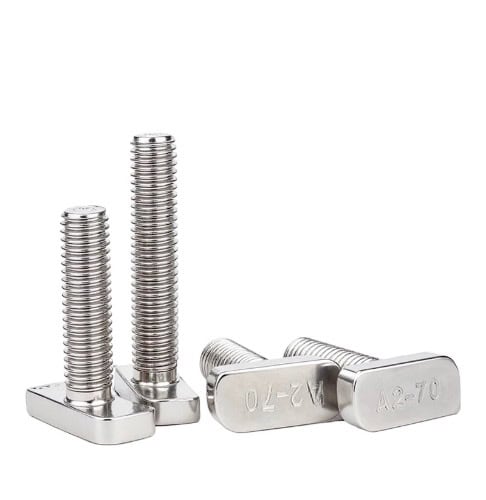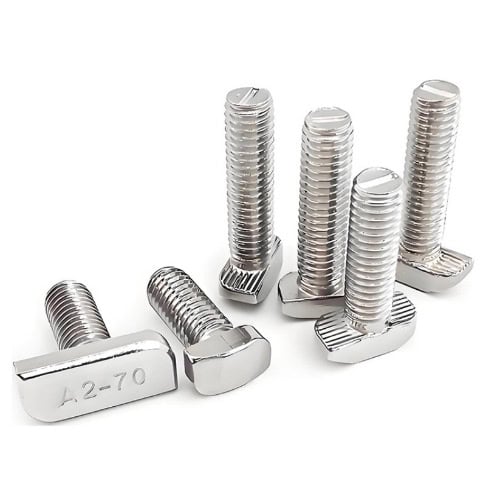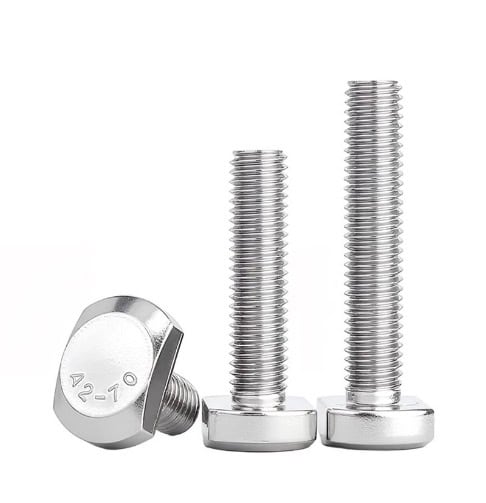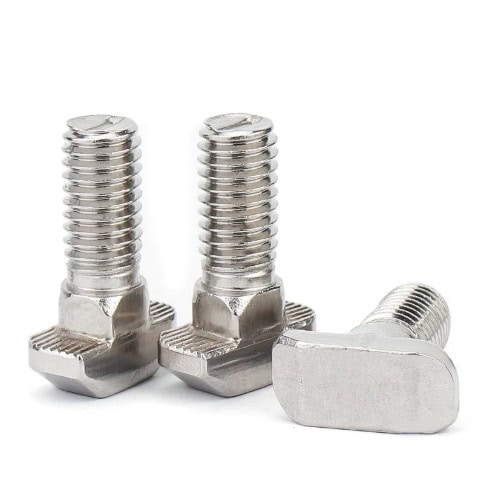T-type screw
High-precision, high-strength fastening solutions designed for modular assemblies, machine frames, fixtures, and more. Our T-Slot Bolts combine robust engineering with versatile performance to meet the demands of both technical specifiers and purchasing decision-makers.
Home - T-type screw
Manufacturing Process
High-Strength Alloy Steel (Grade 12.9) for maximum tensile performance
304 / 316 Stainless Steel for superior corrosion resistance
Carbon Steel grades for cost-effective general-purpose use
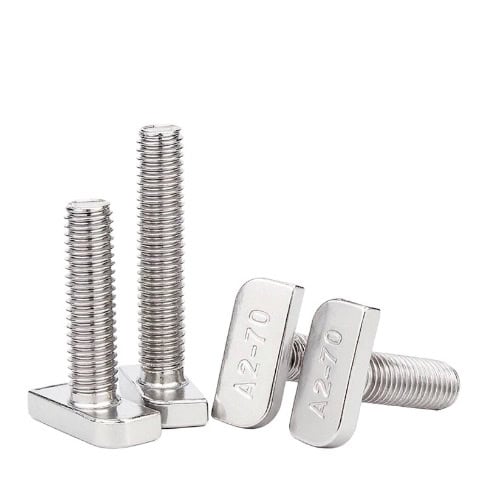
Typical Product Variants
| Part Number | Size (Metric) | Material | Finish | Recommended Torque (Nm) |
| TS-M6-20-Z | M6 × 20 mm | Alloy Steel (12.9) | Zinc Clear Passivate | 5–7 |
| TS-M8-30-BL | M8 × 30 mm | Carbon Steel | Black Oxide | 12–15 |
| TS-M10-50-SS | M10 × 50 mm | 316 Stainless Steel | Electropolished & Passivated | 25–30 |
| TS-M12-60-YZ | M12 × 60 mm | Alloy Steel (10.9) | Yellow Zinc Passivate | 40–45 |
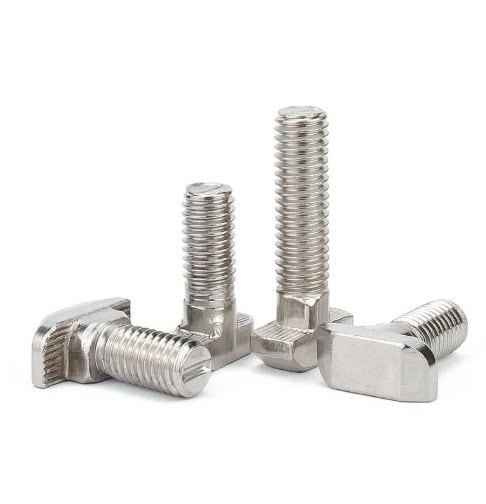
Cold Heading & Machining
Cold Heading: Forms bolt head and shank in a single press operation, ensuring grain flow integrity and excellent fatigue life.
CNC Turning & Milling: Achieves tight dimensional tolerances (±0.05 mm) on shank diameter, shoulder length, and head geometry.
Heat Treatment
- Quenching & Tempering: Delivers uniform hardness (HRC 38–42 for alloy steel), optimized yield strength, and crack-resistance. Solution Annealing (for stainless variants) to relieve stress and stabilize microstructure.
Typical products

304 stainless steel T-bolts M8M10
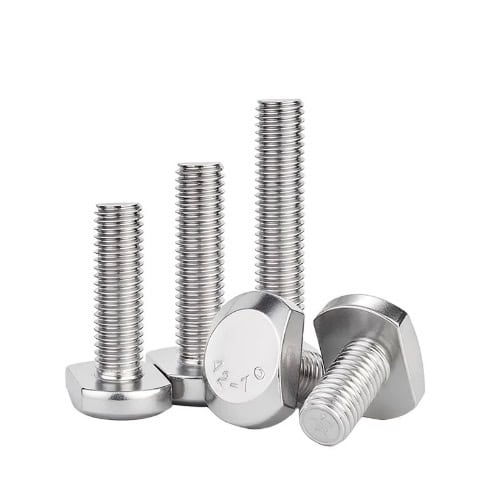
304 stainless steel T-slot bolts GB37 M6M8M10M12

304T hammer head bolts M5M6M8M10
Applications and Use Cases

Securely mount linear guides, sensor brackets, and end-effectors on T-slot frames—resists dynamic loads and vibration.Machine Tooling & Fixtures Build jigs, fixturing plates, and workholding assemblies that require precise alignment and repeatable repositioning.

Assemble ergonomic workbenches, safety guards, and equipment enclosures—fast reconfiguration without welding or drilling.Renewable Energy Systems Fasten solar panel rails, wind-turbine maintenance platforms, and mounting brackets in corrosive outdoor settings.
Top T Type Screw Options for Your Next Project: A Comprehensive Guide
Introduction to T Type Screws
T Type Screws are a type of fastener used for attaching and securing various materials – suitable for applications in multiple industries.
They are characterized by their unique T-shaped head, which provides a secure grip for screwdrivers and other tools.
The screw head is designed to prevent cam out and ensure a secure fastening process.
T Type Screws are available in various materials, including stainless steel and aluminum.
Types of T Type Screws
Hex head T Type Screws feature a hexagonal head and are often used with an Allen wrench for secure fastening.
Flat head T Type Screws have a flat top and are countersunk into the material for a flush finish.
Domed head T Type Screws have a slightly rounded top and are used for applications where a smooth finish is required.
Pointed tip T Type Screws are used for applications where a sharp point is necessary for easy installation.
Screw Head Options
Phillips drives are a common type of screw head, featuring a cross-shaped slot for secure fastening.
Slotted screws have a single slot in the head and are often used with a flat head screwdriver.
Robertson drive screws feature a square-shaped slot and are used for applications where high torque is required.
Hex head screws are used with an Allen wrench and provide a secure fastening process.
Drive Types
The drive type of a screw head determines which tool is needed for installation and removal, and can impact both the ease of use and the security of the fastener. Common drive types include slotted, Phillips, hex (Allen), and Robertson. A slotted screw features a single straight slot across the head, making it compatible with a flat head screwdriver. Phillips drives, with their cross-shaped slot, are designed to reduce the risk of the screwdriver slipping out, which helps prevent cam out. Hex drives have a hexagonal shape in the screw head, requiring an Allen wrench for turning—this design is popular for applications needing higher torque and a secure fit. The Robertson drive, recognized by its square slot, is favored in many industries for its ability to hold the screwdriver firmly in place, reducing the chance of slipping and making installation faster. Each drive type offers unique advantages, so choosing the right shape and slot for your screw head can make a significant difference in both performance and efficiency.
Nut and Washer Options
Hex nuts are six-sided and often used with T Type Screws for secure fastening.
Nylon insert lock nuts prevent backing off and provide a secure fastening process.
Flat washers distribute the load and prevent damage to the material.
Square washers are used for specific applications where a square shape is required.
Wing nuts feature wings that allow for easy hand tightening without tools, making them ideal for applications requiring quick adjustments.
T Type Screw Applications
T Type Screws are used in various industries, including construction, automotive, and electronics.
They are suitable for attaching and securing materials such as wood, metal, and plastic.
T Type Screws are often used in applications where high torque is required, such as in machinery and equipment.
They are also used in security-sensitive applications, such as in cameras and video equipment.
Additionally, T Type Screws are commonly used in ground mount solar systems, where they help secure panels to ground-based structures and ensure proper ground clearance.
Benefits of T Type Screws
T Type Screws provide a secure fastening process and prevent cam out.
They are available in various materials and drive types, making them suitable for multiple applications.
T Type Screws are easy to install and remove, using common tools such as screwdrivers and Allen wrenches.
They are resistant to corrosion and can withstand harsh environments.
Specifications
T Type Screws are available in various diameters, lengths, and widths, making them suitable for multiple applications.
The thread type and coating can vary, depending on the application and material.
The screw head type and drive type can also vary, depending on the application and required torque.
The material and finish can be customized to meet specific requirements. Additional details such as coating, finish, and custom options are available upon request.
Thread Types and Coatings
The threads of screws and bolts are essential for creating a strong, lasting connection between materials. Thread types vary, with coarse, fine, and extra-fine options available to suit different applications. Coarse threads are ideal for quick assembly and are suitable for softer materials, while fine threads provide greater holding power in harder materials. Extra-fine threads are used in specialized applications where precision is key. To enhance performance, screws and bolts can be coated with materials such as nylon or zinc. Nylon coatings add a layer of corrosion resistance and help prevent loosening, making them suitable for outdoor or high-vibration environments. Zinc coatings also protect against rust and extend the life of the fastener. The choice of thread type and coating should be based on the material being fastened, the desired level of security, and the environmental conditions. Selecting the right combination ensures your screws and bolts remain secure and durable over time.
Security Features
T Type Screws can feature security-driven designs, such as tamper-resistant screw heads.
They can be used in security-sensitive applications, such as in cameras and video equipment.
The screw head type and drive type can be customized to prevent unauthorized access.
T Type Screws can be used with specialized tools, such as security screwdrivers.
Installation and Removal
Proper installation and removal of screws and bolts are crucial for maintaining the integrity of your project. Always use the correct tool for the screw head—whether it’s a screwdriver, Allen wrench, or specialized tool—to avoid damaging the head or stripping the threads. For hex head screws, an Allen wrench or socket is typically required, while slotted and Phillips screws need the appropriate screwdriver. Applying the right amount of torque is important; too much force can strip threads or damage the material, while too little may result in a loose fastener. For security screws or those with specialized heads, use the recommended tools to ensure safe and effective installation. When removing screws, work carefully to avoid damaging the surrounding material or the fastener itself. Following these best practices helps ensure that your screws and bolts are installed securely and can be removed without difficulty when needed.
Maintenance and Inspection
T Type Screws should be regularly inspected for signs of wear and tear.
The screw head and thread should be checked for damage or corrosion.
The material and finish should be inspected for signs of degradation.
Maintenance and repair can be performed using common tools and materials.
Safety Precautions
T Type Screws can be hazardous if not handled properly.
The installation and removal process can be hazardous if proper precautions are not taken.
The screw head and thread can be sharp, causing injury if not handled carefully.
Safety equipment, such as gloves and safety glasses, should be worn when handling T Type Screws.
Choosing the Right T Type Screw
The right T Type Screw should be chosen based on the application and required torque.
The material and finish should be considered, depending on the environment and required durability.
The screw head type and drive type should be considered, depending on the application and required security.
The diameter and length should be considered, depending on the application and required fit.
T Type Screw Manufacturers
T Type Screws are manufactured by various companies, including specialized fastener manufacturers.
The manufacturers can provide customized solutions, depending on the application and required specifications.
The manufacturers can also provide specialized tools and materials, depending on the application and required security.
The quality and reliability of the manufacturer can be an important factor in choosing the right T Type Screw.
Manufacturers work closely with customers to ensure their needs are met and to deliver high-quality service tailored to each client.
Suppliers and Distributors
Finding the right supplier or distributor is key to ensuring you receive high-quality screws and bolts for your project. The industry offers a wide range of options, from specialized manufacturers to large-scale distributors, each catering to different customer needs. When making a purchase, consider factors such as price, product quality, and availability. Reliable suppliers often provide detailed product information, including dimensions, material, and specialized features, to help you make an informed decision. Some suppliers also offer custom services, such as unique threading or coatings, to match your specific requirements. Whether you’re buying in bulk for an industrial application or selecting a specialized fastener for a unique project, working with a reputable supplier ensures you receive the right screws and bolts at a competitive price, with the support and service you need for a successful installation.
Cost and Budgeting
The cost of T Type Screws can vary, depending on the application and required specifications.
The material and finish can affect the cost, depending on the required durability and environment.
The screw head type and drive type can also affect the cost, depending on the required security and torque.
The quantity and delivery time can also affect the cost, depending on the application and required timeline.
Quality and Reliability
The quality and reliability of T Type Screws are important factors in choosing the right screw.
The material and finish should be of high quality, depending on the required durability and environment.
The screw head type and drive type should be of high quality, depending on the required security and torque.
The manufacturer and supplier should be reputable and reliable, depending on the required quality and delivery time.
The Importance of screw head Type
The screw head type is an important factor in choosing the right T Type Screw.
The screw head type can affect the security and torque of the screw, depending on the application and required specifications.
The screw head type can also affect the ease of installation and removal, depending on the application and required tools.
The screw head type can be customized, depending on the application and required security.
Environmental Considerations
T Type Screws can be used in various environments, including harsh and corrosive environments.
The material and finish should be chosen based on the environment and required durability.
The screw head type and drive type should be chosen based on the environment and required security.
The thread type and coating should be chosen based on the environment and required corrosion resistance.
Troubleshooting Common Issues
Common issues with T Type Screws can include stripped threads and damaged screw heads.
The issues can be caused by improper installation or removal, or by using the wrong tools or materials.
The issues can be resolved by using specialized tools and materials, or by consulting with a professional.
Regular maintenance and inspection can help prevent common issues and ensure the longevity of the screw.
Conclusion
T Type Screws are a versatile and reliable fastening solution for various applications.
The right T Type Screw should be chosen based on the application and required specifications.
The material, finish, screw head type, and drive type should be considered, depending on the environment and required durability and security.
Regular maintenance and inspection can help ensure the longevity of the screw and prevent common issues.
Solution Guidelines for T Type Screws
When working with T type screws, following proper guidelines ensures optimal performance and longevity of your fastening projects. Here are key solution guidelines to consider:
Choosing the Right Screw
Select the T type screw based on your specific application needs. Consider factors such as material compatibility (wood, metal, plastic), required torque, environmental conditions, and security requirements. Choose the appropriate screw head type—hex, flat, domed, or pointed tip—to match your installation tools and desired finish.Proper Installation Tools
Use the correct screwdriver or wrench that matches the screw head drive type (Phillips, slotted, Robertson, Allen wrench) to prevent cam out and damage to the screw head. For security-sensitive applications, specialized security screwdrivers may be necessary.Installation Technique
Ensure screws are fastened securely but avoid over-tightening, which can strip threads or damage materials. For applications involving T groove slots or tapered shoulders, align the screw properly to fit the groove or slot dimensions.Maintenance and Inspection
Regularly inspect screws for signs of wear, corrosion, or damage to the head and threads. Replace any screws that show degradation to maintain joint integrity. Clean and lubricate screws if necessary to prevent seizing in harsh environments.Safety Precautions
Wear appropriate safety equipment such as gloves and safety glasses during installation and removal to prevent injury from sharp screw heads or tools. Handle screws carefully to avoid cuts or punctures.Purchasing Considerations
Buy screws from reputable manufacturers to ensure quality and reliability. Consider factors such as material finish, dimensions (length, diameter, thickness), and quantity. Verify if the screws meet industry standards and are suitable for your application.
On digital product pages, users may initially see brief content with only partial content visible. To access the full content, users can double tap or click to expand the product description and view all details. This ensures that all necessary information is available before making a purchase decision.
Contact DingLong
Frequently Asked Questions (FAQ)
Q: Frequently Asked Questions (FAQ)
A: Review the slot profile width, material thickness, and expected load. For light-duty fixtures, M6–M8 is common; heavy-duty frames often require M10–M12. Contact our technical team for a torque-load analysis.
Q: Can these bolts be reused after disassembly?
A: Yes—provided the threads and head seat show no signs of wear or galling. We recommend inspecting coatings and retorquing to spec after re-installation.
Q: What corrosion resistance levels can I expect?
A: Zinc-plated bolts endure up to 500 hours in salt spray tests; electropolished stainless variants exceed 1,000 hours.
Q: Do you offer pre-lubricated or anti-seize coatings?
A: Yes. We can supply bolts with PTFE-based dry film lubrication or molybdenum-disulfide anti-seize for high-temperature applications.
Q: Are custom part numbers and packaging options available?
A:Absolutely. Customize part numbering, bulk packaging, or kitting to streamline your inventory and assembly processes.
Q: What is your typical lead time and MOQ?
A: Standard stock sizes ship within 7–10 business days with no MOQ; custom items generally require a 500-piece minimum and ship in 3–4 weeks.

